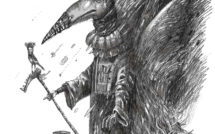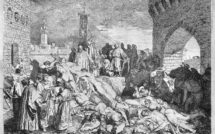

In the evening they are hungry and restless. No meat for days. No hunting since they themselves were captured. Instincts worn down by captivity until they lie bare like gnawed bones. Fire blazes in the cats’ eyes. It is the reflection of the torches. These herald the arrival of the handlers who, each time they pass by on their rounds, peer through the bars, listen into the darkness for signs that their cargo is still alive.
The cage opens. Yet rather than a meal, it is a den that awaits them. Torches guide the way. Spears force them into a black, windowless hole, two wooden crates barely higher than their withers. These are rolled onto the waiting wagons. Senses sharpened by hunger. Commotion, movement, a clamor of voices: the barked orders of the handlers, the piercing whistle of the driver, the jangling of the bridles, the clunking of the corn barges against a far-off quay, the clatter of the wheels, the flick of a rope.
The convoy jerks into motion, sets out on its preordained path. To the innermost heart of the city. To the outermost reaches of being. The axles creak at every turn.
The two animals are separated by a single partition. They crouch in the darkness. They know everything and see nothing. Not the moldering docks and the steaming knacker’s yard, not the Praenestine Gate, which they pass, not the buildings of marble and Tiburtine stone that gleam even at night. They are animals. Animals like us. Doomed like us.
It is still night when they are taken into the catacombs. During the last hours of darkness they turn in tight, aimless circles, strangers to one another—whether equally matched remains to be seen. The cells are musty; dungeons hidden from the sun. And when it finally rises, not one ray filters down here, into this underworld of passageways, ramps, and lifts, of traps and doors.
Far above them a sail is now unfurled until it arches like a second sky over the stone bowl that is gradually filling with peoIn the evening they are hungry and restless. No meat for days. No hunting since they themselves were captured. Instincts worn down by captivity until they lie bare like gnawed bones. Fire blazes in the cats’ eyes. It is the reflection of the torches. These herald the arrival of the handlers who, each time they pass by on their rounds, peer through the bars, listen into the darkness for signs that their cargo is still alive. The cage opens. Yet rather than a meal, it is a den that awaits them. Torches guide the way. Spears force them into a black, windowless hole, two wooden crates barely higher than their withers. These are rolled onto the waiting wagons. Senses sharpened by hunger. Commotion, movement, a clamor of voices: the barked orders of the handlers, the piercing whistle of the driver, the jangling of the bridles, the clunking of the corn barges against a far-off quay, the clatter of the wheels, the flick of a rope. The convoy jerks into motion, sets out on its preordained path. To the innermost heart of the city. To the outermost reaches of being. The axles creak at every turn. The two animals are separated by a single partition. They crouch in the darkness. They know everything and see nothing. Not the moldering docks and the steaming knacker’s yard, not the Praenestine Gate, which they pass, not the buildings of marble and Tiburtine stone that gleam even at night. They are animals. Animals like us. Doomed like us. It is still night when they are taken into the catacombs. During the last hours of darkness they turn in tight, aimless circles, strangers to one another—whether equally matched remains to be seen. The cells are musty; dungeons hidden from the sun. And when it finally rises, not one ray filters down here, into this underworld of passageways, ramps, and lifts, of traps and doors. Far above them a sail is now unfurled until it arches like a second sky over the stone bowl that is gradually filling with people: consuls and senators, vestal virgins and knights, citizens and freedmen, discharged legionaries—and at the very top, around the edge, the women. They have all come to see. They have come to be seen. It is a feast day, a spectacle, and anyone calling it a game has failed to appreciate the holy order inherent in it and the deadly seriousness that attends it.
The day is still young as the emperor steps into his box, pushes back the hood of his robe, shows off his tall sturdy physique, his stout neck, his imposing profile that everyone knows from the coins. When finally he sits down, the dungeon is unlocked, a chasm opens at ground level and a colossal animal of a kind never before seen emerges from the pit, bursts into the ring, races around the enclosure, leaps high against the parapet separating the public from the arena and, with a thunderous din, beats its mighty paws against the iron gate, stops, looks around, and for an infinite moment stands still.
This beast is preceded by a reputation that transcends oceans and mountains: it is said to originate from the depths of the forests of Hyrcania, the wild, rugged, evergreen land that borders the Caspian Sea. Its name is at once a curse and an incantation. It is reputed to be swift as an arrow, wild as the Tigris, the fastest flowing of all rivers, from which it takes its name. Its fur blazes red as an open fire, the sooty stripes akin to branches in the embers, the facial features finely drawn, the ears upstanding, the cheeks powerful, the muzzle bristling with white whiskers, the eyes glowing green beneath heavy brows, and on its forehead a dark symmetrical marking, the meaning of which no one knows.
The creature shakes its huge head, reveals its large, terrible teeth, its two pointed fangs, its fleshy maw. It runs its tongue over its bare nose. A growl rises up from its throat; a hoarse snarl unlike anything heard before echoes through the terraces—a bloodcurdling sound, after which every word becomes a whisper. And a rumor circulates, half lore, half poem: that there exist only females of its species, for the animal is savage, as savage as only a mother can be when robbed of her offspring. Chance alone bears out the assertion: beneath the tail with its brown-black rings lies concealed a fertile womb that will bear no more cubs.
The animal moves off again, paces the ring with silent steps, clings to the shadow cast by the walls, looks for a spot offering refuge, quiet, and shelter—and finds none. There is only the greasy gray of the palisade, the barred openings, the white dazzle of the billowing togas, patches of brightness, naked faces frozen into masks.
When, in fact, had they first set eyes on this animal? Not in a nightmare, as a man-eating manticore with the sneering face of a child, its bared jaws full of powerful teeth, its tail armed with stings, but in the flesh, part of an Indian delegation on the shores of the island of Samos. On that occasion too it had been a female, the only one of the group of solitary beasts to have survived the desperately long, torturous journey. It was paraded before Augustus on a wrought-iron chain as a gesture of reverence—and as a hideous wonder of nature, as rare and horrifying as the herm-like boy who had been made to stand beside it: half-naked, his whole body dusted with spices, with no arms, these having been cut off at the shoulders when he was still an infant. There they stood, the snarling animal and the mutilated human—two wondrous beings, a bizarre pair, a cue for poets to pen epigrams about the majesty of the abominable.
Judith Schalansky, born in Greifswald in 1980, lives in Berlin and works as a writer, book designer, and editor (of the prestigious natural history list at Matthes und Seitz). Her books, including the international bestseller Atlas of Remote Islandsand the novel The Giraffe’s Neck, have been translated into more than twenty languages.
This excerpt from AN INVENTORY OF LOSSES is published by permission of New Directions Publishing. Copyright © 2018 by Judith Schalansky. Translation copyright © 2020 by Jackie Smith
Published on December 8, 2020.




